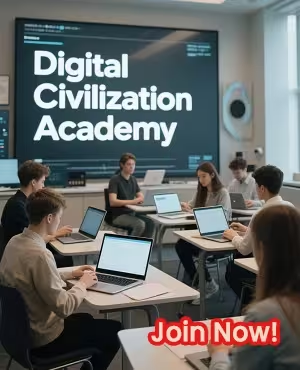
The digital revolution has fundamentally altered the fabric of Western civilization, creating unprecedented changes that rival the Renaissance and Industrial Revolution in scope and impact. This western civilization’s transformation represents more than technological advancement—it’s a complete reimagining of how societies function, communicate, and evolve.
The Dawn of Digital Civilization
Western civilization’s transformation began subtly in the late 20th century but has accelerated exponentially since the millennium. Unlike previous civilizational shifts that took centuries, this digital metamorphosis has compressed decades of change into mere years. The internet, smartphones, and artificial intelligence haven’t just changed how we work—they’ve revolutionized how we think, relate, and exist as a society.
This transformation touches every aspect of Western life. Traditional institutions that stood for centuries—banks, universities, governments, and even relationships—now operate in fundamentally different ways. The digital era has created new power structures while dismantling old ones, leading to what scholars call the “Great Rewiring” of Western society.
Reshaping Democratic Participation
Democracy itself has undergone radical transformation in the digital age. Social media platforms have become the new town squares, where political discourse happens in real-time across continents. Citizens can now directly influence policy through online campaigns, petition platforms, and digital activism that reaches millions instantly.
However, this democratization of information has also created challenges. The same tools that empower grassroots movements also enable the spread of misinformation and political polarization. Western democracies are grappling with how to maintain informed public discourse while preserving free speech in an environment where anyone can broadcast to millions.
Digital voting systems, online government services, and e-governance initiatives represent practical applications of this transformation. Countries like Estonia have pioneered digital citizenship, allowing global participation in their digital society—a concept that would have been unimaginable just decades ago.
Economic Revolution: From Industrial to Digital
The economic foundations of Western civilization have shifted from manufacturing and services to data and innovation. The digital economy now represents the largest source of wealth creation, with companies like Apple, Microsoft, and Google becoming more valuable than entire nations’ GDPs.
This economic transformation has created new forms of work and wealth. The gig economy, remote work, cryptocurrency, and digital entrepreneurship have redefined traditional employment relationships. Millennials and Gen Z workers increasingly prioritize flexibility, purpose, and digital connectivity over traditional career paths their predecessors valued.
The concept of ownership itself is evolving. Digital assets, from cryptocurrencies to NFTs, challenge traditional notions of property and value. Subscription-based economies mean people access rather than own products and services, fundamentally altering consumer behavior and business models.
Cultural Renaissance in the Digital Realm
Western civilization’s transformation extends deeply into cultural expression and creativity. Digital platforms have democratized content creation, allowing anyone to become a publisher, filmmaker, or artist. YouTube creators, podcast hosts, and social media influencers wield cultural influence that rivals traditional media moguls.
Art, music, and literature are experiencing a renaissance through digital mediums. Virtual reality experiences, digital art installations, and AI-generated creative content are pushing boundaries of what constitutes art. Streaming services have globalized Western cultural exports while simultaneously exposing Western audiences to diverse global perspectives.
The concept of community has been revolutionized. Online communities often provide stronger connections than geographical neighbors. Gaming communities, professional networks, and interest-based groups create new forms of social belonging that transcend traditional boundaries of race, class, and nationality.
Education and Knowledge Transformation
The transformation of Western civilization is perhaps most evident in how knowledge is created, shared, and consumed. Traditional educational institutions are being challenged by online learning platforms, massive open online courses (MOOCs), and self-directed learning resources.
Wikipedia represents one of humanity’s greatest collaborative achievements—a comprehensive encyclopedia created entirely through digital cooperation. This model of crowd-sourced knowledge creation is being applied to scientific research, journalism, and problem-solving at unprecedented scales.
Artificial intelligence is beginning to augment human learning and decision-making. AI tutors, personalized learning algorithms, and intelligent research assistants are reshaping how Western societies approach education and skill development.
Challenges and Opportunities
This transformation isn’t without significant challenges. Privacy concerns, digital inequality, cybersecurity threats, and the psychological effects of constant connectivity represent serious considerations for Western societies.
The “digital divide” creates new forms of inequality based on access to technology and digital literacy. Rural communities, elderly populations, and economically disadvantaged groups risk being left behind in this rapid transformation, potentially exacerbating existing social tensions.
Mental health challenges associated with social media use, screen addiction, and digital overwhelm are forcing Western societies to reconsider their relationship with technology. The pursuit of digital wellness and mindful technology use is becoming increasingly important.
The Future of Western Digital Civilization
Looking ahead, emerging technologies like quantum computing, advanced AI, and brain-computer interfaces promise even more dramatic transformations. The metaverse concept suggests entire parallel digital societies could emerge, where people work, socialize, and live substantial portions of their lives.
Genetic engineering, nanotechnology, and biotechnology convergence with digital systems could fundamentally alter what it means to be human in Western civilization. These technologies raise profound ethical questions about enhancement, equality, and identity.
Conclusion: Embracing Continuous Transformation
Western civilization’s transformation in the digital era represents the most significant societal shift in human history. Unlike previous transformations that had clear beginning and end points, the digital revolution appears to be a state of continuous change and adaptation.
Success in this new era requires embracing uncertainty, developing digital literacy, and maintaining human values while leveraging technological capabilities. Western societies that can balance innovation with ethical considerations, inclusion with efficiency, and global connectivity with local community will thrive in this ongoing transformation.
The digital era hasn’t just changed Western civilization—it has fundamentally redefined what civilization means in an interconnected, rapidly evolving world. As we navigate this transformation, we’re not just witnesses to history—we’re active participants in creating the future of human society.




































